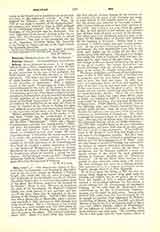

Bebian, ROCH-AMBOISE-AUGUSTE, b. August 4, 1789 at Pointe-a-Pitre, Guadeloupe; d. there February 24, 1839. His father sent him to France, where he was committed to the care of his godfather, the Abbe Sicard, the well-known educator of the deaf and dumb. The latter put him under the direction of Abbe Jauffret then exhibiting a great interest in the education of deaf-mutes. After a brilliant course at the Lycee Charlemagne in Paris, Bebian devoted himself to the study of the system of education of the deaf and dumb. He followed the courses of instruction given by Abbe Sicard and gave special attention to Laurent Clerc, a deaf-mute who afterwards became president of an institution for the deaf and dumb at Hartford, Connecticut, U.S.A. As prefect of studies in the institution for the deaf and dumb at Paris, he directed all his efforts to finding the signs best adapted, in precision and extension of meaning, to the expression of the ideas of the deaf and dumb.
Bebian published the result of his studies in his first book, “Essai sur les sourds-muets et sur le langage naturel” (1817). His principal works, under the titles “Mimographie” (1822) and “Manuel d’enseignement pratique des sourds-muets” (1822), laid down the principles used in the institution for the deaf and dumb in Paris. After leaving this school, he published several other works, the most important being “L’education des sourds-muets mise .i la portee des instituteurs primaires et de tous les parents”. Having refused the direction of the schools for the deaf and dumb of St. Petersburg and New York he founded a similar institution at Paris on the boulevard Montparnasse; later he became director of the school of Rouen and finally went back to Guadeloupe, where he founded a school for the negroes. He had already written, in 1819, “Eloge historique de l’abbe de l’Epee”, which was awarded the prize offered by the Academy of Sciences.
G. M. SAUVAGE

